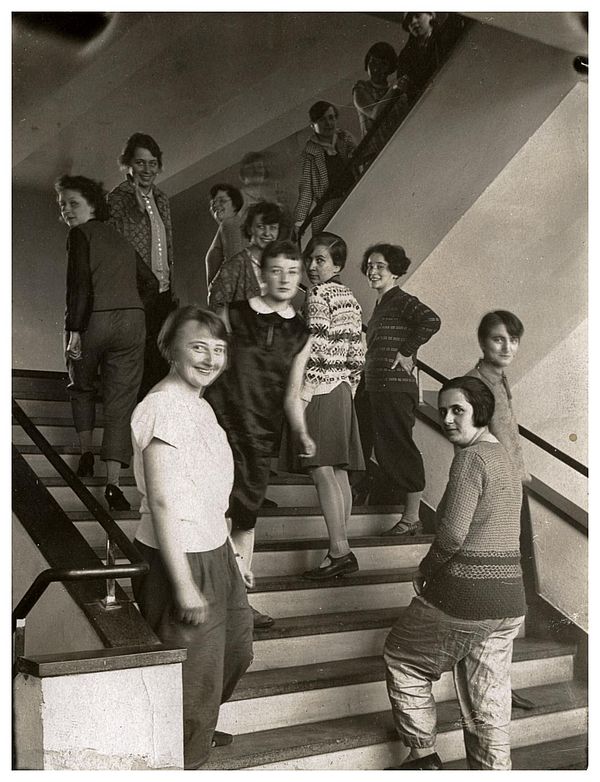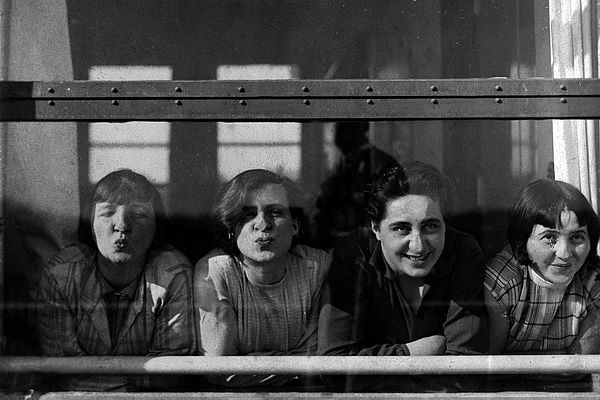No prosperity without women
Isabel Allende on women as drivers of innovation
Isabel Allende is a Chilean-American bestselling author. In her work, as with her foundation, she advocates the equality of the sexes. Progress, according to the author, is a question of emancipation.

About Isabel
Isabel Allende (San Rafael) is a Chilean-US American bestselling author. Awarded with the Anisfield-Wolf Book Award, she is also the founder of a widely active foundation to support women and girls.
[Translate to English:] headline
The Manifesto of the Staatliche Bauhaus Weimar, published in 1919, reveals what Walter Gropius wanted in the beginning of his educational project—to bring art and craftsmanship together “without classifying pretensions” for the creation of ideal constructions of the future. Equal opportunities were anchored in the concept of the school, which provided equality for all the educational strata and both sexes; talent alone determined the suitability of a Bauhaus student. Despite violent setbacks to this claim at the Bauhaus itself, the ideal of complete equality could no longer be abandoned – and is more necessary today than ever, says Isabel Allende.
Our magazine deals with the attitude of modernity. You are working a lot on women’s self empowerment, which seems to be a core issue of modernization. Is there a link between women’s emancipation and everybody’s progress?
Absolutely. If we empower women, we empower the family and therefore we empower the community and eventually the country. The most backward countries in the world are where women are submitted to exploitation, discrimination and all kinds of abuse. Where women are empowered, the countries prosper. That’s why I have dedicated part of my life and of my resources to my foundation. The mission of this foundation is dedicated to help women and children.
Was there a certain event in your life that encouraged you to become active for women rights?
I must have been very, very young when I realized that I didn’t want to be a victim like my mother. I wanted to be powerful like my grandfather. Very young I rebelled against all forms of authority, especially male authority. That means my grandfather, my uncles, my stepfather, the police, the church: every kind of male authority. In Chile at this time all authority was male because it was a real patriarchy. I was very rebellious without being able to articulate why I was so angry. I was an angry girl and then a very rebellious teenager. Rebellious intellectually because I never did drugs or ran away from home, not those kind of things. But I was always challenging and arguing. Then I discovered feminism. I discovered that I was not inventing anything. There were books, there were women feminists that had a particular kind of language to express all this that I was feeling.
Even at the Bauhaus, where the manifesto promised to promote students regardless of their sex, it was much more di cult for women to become visible as designers than it was for their male colleagues. What are the main challenges for women in today’s professional life?
In the United States women make 77 per cent of every dollar that a man makes in the same job. They don’t get the same opportunities to have a career. They often have to choose between their families and their jobs.
And the government, the state, the society don’t provide any help for women. In Europe there is maternity leave for the mother and the father. Here, there’s none of that. It’s very hard for women to have children and to have a career. Also in certain pockets of society, let’s say among the Latino population, they also are confronted by the fact that they don’t have legal status. So they can be arrested and deported any minute. That means that they can only get the illegal jobs paid under the table in cash with no benefits. If one of their kids is sick, they have to wait until the child is really, really sick to the take them to emergency room.
You live in California but you grew up in Chile. What’s the difference between women’s situation in Northern and in Latin America?
Even in Latin America there are great differences between the status of women in one country or the other. In Chile we are very advanced in that sense. We have a woman president who is a doctor and a socialist—and this is her second term. She has stressed family and the situation of women. That’s the focus of her government. So a lot has been achieved. But still when I go to Chile I find it very patriarchal. It’s still a very male, chauvinistic society.
Everybody is talking about the chauvinistic tendencies that can be seen in the new American government. What needs to change in our culture, in our belief system, in our behavior to improve the situation of women and children in the so-called Western society?
First we have to change the narrative. We have to be clear about what the situation is. I only have granddaughters. They don’t want to be called feminists. There are even blogs and social media groups despising feminism. These girls don’t know that they are privileged, that they are benefitting from the struggles of their mothers and their grandmothers and that 80 per cent of the world’s women don’t have the same rights. So they have to fight for them. But they don’t see that. They don’t see either that they can lose everything they have if the wrong circumstances happen, like for example, in Afghanistan. There were women doctors, women lawyers—and then the Taliban came. Within 24 hours these women were either in their house or under their burka, not allowed to go out in the street without a man from the family. Things can change very fast. The first and the most vulnerable victims of war are women and children.
So feminism isn’t as strong as it was before, you say. Maybe there are just new topics on the resistance’s agenda?
I don’t know. There is a new wave of young people that I meet all the time that just do their work. They don’t go out and they are not proclaiming anything. The only ones fighting and proclaiming things today are the people who have differences in gender, lesbians, gays, and transgender for example. That movement is very strong and outspoken, at least in the United States, not so much in Latin America. They are in a way replacing that way of very combative feminists of my generation. You already mentioned your foundation that works on empowering women and girls in the area of reproductive rights, economic independence and freedom from violence. Is there one project that you remember as particularly important? There is one project that embodies what we are trying to do. Let me tell you the story. There is this little old lady Olga Murray who, when she was 60, went to Nepal as a tourist. She was tracking in the mountains there, broke her leg. A Sherpa carried her in a basket on his back on the way to a village. In this village she had to stay until they would pick her up. There was a festival in which busses came from the cities to buy little girls from the fathers, sometimes eight, sometimes six years old. And they would bring them to the city and sell them as domestic servants. They would be slaves for 10 to 20 years. They will have no education, they will be treated as dogs, eating the scabs of the family, beaten up and raped. Olga alone with her Nepal Youth Foundation has saved around 12,000 girls from domestic slavery. She is now establishing nutrition clinics for the starving children in Nepal. This is what one person can do. She changed the culture in the country. Because now the government has declared the practice of selling children for domestic slavery illegal. This is why I believe in the grassroot concept. They begin at a very basic level and then things start to happen.
Thinking of the new rise of populism and extremism: Do you see a decrease of understanding also in the so-called modern world?
No, I don’t believe that. We are progressing. Look, I am 75 years old. I was born in the middle of the Second World War when there was no declaration of Human Rights. It was the time of the Holocaust and the time when we were throwing atomic bombs on Japan. No one was talking about women’s rights or children’s rights then. In my lifetime I have seen how the world has become better not worse. We still have wars, we still have discrimination, we have torture, we have executions, we have terror, we have a lot of stuff . But more people are educated today than they were when I was born. And more people have access to the resources than they had before. The great education that was before was available only for privileged people.
Thinking of the new rise of populism and extremism: Do you see a decrease of understanding also in the so-called modern world?
No, I don’t believe that. We are progressing. Look, I am 75 years old. I was born in the middle of the Second World War when there was no declaration of Human Rights. It was the time of the Holocaust and the time when we were throwing atomic bombs on Japan. No one was talking about women’s rights or children’s rights then. In my lifetime I have seen how the world has become better not worse. We still have wars, we still have discrimination, we have torture, we have executions, we have terror, we have a lot of stuff . But more people are educated today than they were when I was born. And more people have access to the resources than they had before. The great education that was before was available only for privileged people.
[Translate to English:] Bild

Because your stepfather was a diplomat, you started to travel the world at a very young age. In your youth you lived in Beirut, for example. What do you think of the “clash of culture” theory that haunts our politics today, starting from 9/11 to ISIL?
I’m not a political animal, I can’t answer that question. We left Lebanon in 1959 because political upheaval started there, the Marines disembarked and the war begun. I experienced a society in fractions. There were Christians, there were Muslims, there were Druses; they lived in groups but they we living together for years. There was no conflict until conflict happened. We have empowered the terrorists more than the power they really have. I live in the United States. They declared war on terrorism and they said that they have experienced terrorism for the first time. Well, they have forgotten their history. The black population lived in slavery and terror for centuries.
You are not just an activist, but also a widely known and acclaimed author. Your profession is giving birth to stories dealing with human behavior and its psychological, historical, cultural causes. What do you think is the most recent change in the way women think today?
I think that they feel that they can control their lives. And this started with birth control. When women can control their fertility they feel empowered. They have less children, they have more education. Usually they can work. The first step for feminism is birth control.
For this magazine, we asked some of the other artists: how do we teach the future? How do you as an artist reflect on encouraging creativity?
We are all born creative. Every single child is creative. And the society, the parents, life, circumstances crush creativity. I was lucky. Nobody paid attention when I was growing up. I just grew like weed in some corner of the house. Nobody messed around with me. So I could read whatever I wanted, I had no toys, I had to make them by myself and I loved to paint and write stories that nobody read. I was in fact very lucky.
How do you keep that creativity going?
I’m not always inspired. When I finish a book and the book is in my agent’s hands I feel this emptiness. What I’m going to do next? I need that passion inside me to dedicate myself to a project. Sometimes I think there is a book that I will write about something and in the process it turns out to be something completely different. For example: There is this book of mine called “Island Beneath the Sea”. It’s a novel about the slavery in Haiti in the 1800s. I thought I would write a book about the pirates of the Caribbean set in New Orleans. But when I started to research about New Orleans I found out that much of the French favor that this city has came from 10,000 white colonists from Haiti that ran away from the revolution. They were French people, they came with their French customs, and they changed the city completely. Before it was a city of 3,000 people only and 10,000 immigrants came in just one year. So I thought: Why did they run away from Haiti? Then I got completely hooked by Haiti. My book is about that and not about the Caribbean set in New Orleans. But you need to be disciplined. You need to show up in front of your computer daily and you need to be patient. It doesn’t happen if you are not disciplined in your work.
The Bauhaus was very interested in promoting the creativity of its students. What do you tell your students?
Sometimes I have 19-year-old kids that are writing their memoirs. What are they writing about? And then they think they would write the best American novel in one sitting. I keep telling them: “art is like sports. You train and train and train to develop the muscle that will allow you to play the game.”
What thinkers or artists had the biggest influence on you?
Many. I think that the influence of many Latin American writers is present in my books. I belong to the first generation of Latin American writers to grow up reading other Latin American writers. García Márquez was writing when I was in my twenties. So I could read him. I could read Vargas Llosa, I could read Donoso. They had been writing before but their books were not well distributed. So in Chile we couldn’t get Carlos Fuentes until the publishing houses in Barcelona started publishing this great Latin American writer and sending the books to Latin America and distributing them. I grew up with everything available. Then there are other influences like movies. A scene in a movie can trigger a book or a story, also the news in the newspapers. And then there are influences that are not literary. I remember the first time that I thought that I could do anything was when I saw a painting by Chagall. I thought that Chagall was a kid. It didn’t cross my mind that this is a real painter. By that time he was 90 years old. I thought: if this kid can do this, I can do too. The freedom, the color, the abundance of the painting took me like a rock. It sort of liberated something in me. Art didn’t have to be realistic. It didn’t have to be what my teacher was expecting. It could be whatever I wanted.
How do you as an artist think about re-thinking the world as a means of art?
I’m not a preacher; I don’t have any answers or messages. I feel that I am in the world exploring and I’m going around with a candle trying to illuminate little corners. Sometimes I find particles of something that could be true. But I’m not sure. Sometimes I am lucky and I ask the questions that everybody is asking unconsciously. I tap into something that is the unconscious dream, the unconscious hope, the unconsciousness of humanity. Then the book connects to more people. People say: why are your books so popular? I have no idea. But there must be a connection within the story and the reader.
bauhaus now works on creating awareness for the world of tomorrow. What is your dream for the future of the mankind?
I want a fair world and also a joyful world. That people laugh more, enjoy more. A fair world where all of that is available for anybody. I cannot fully enjoy what I have if I see that other people around me don’t have it. When I think of the refugees from Syria and the horrible things that are happening to the people in the world, I feel that sort of hardness inside me that doesn’t allow me to be fully joyful about my own life.
And the final question is for you: What would you like to ask our readers, Isabel?
What is your vision for the future of our world? And how would you make it possible?
[Translate to English:] headline
Thank you for the interview!
This article was originally published in the first issue of the “bauhaus now” magazine.
[NF 2017]


